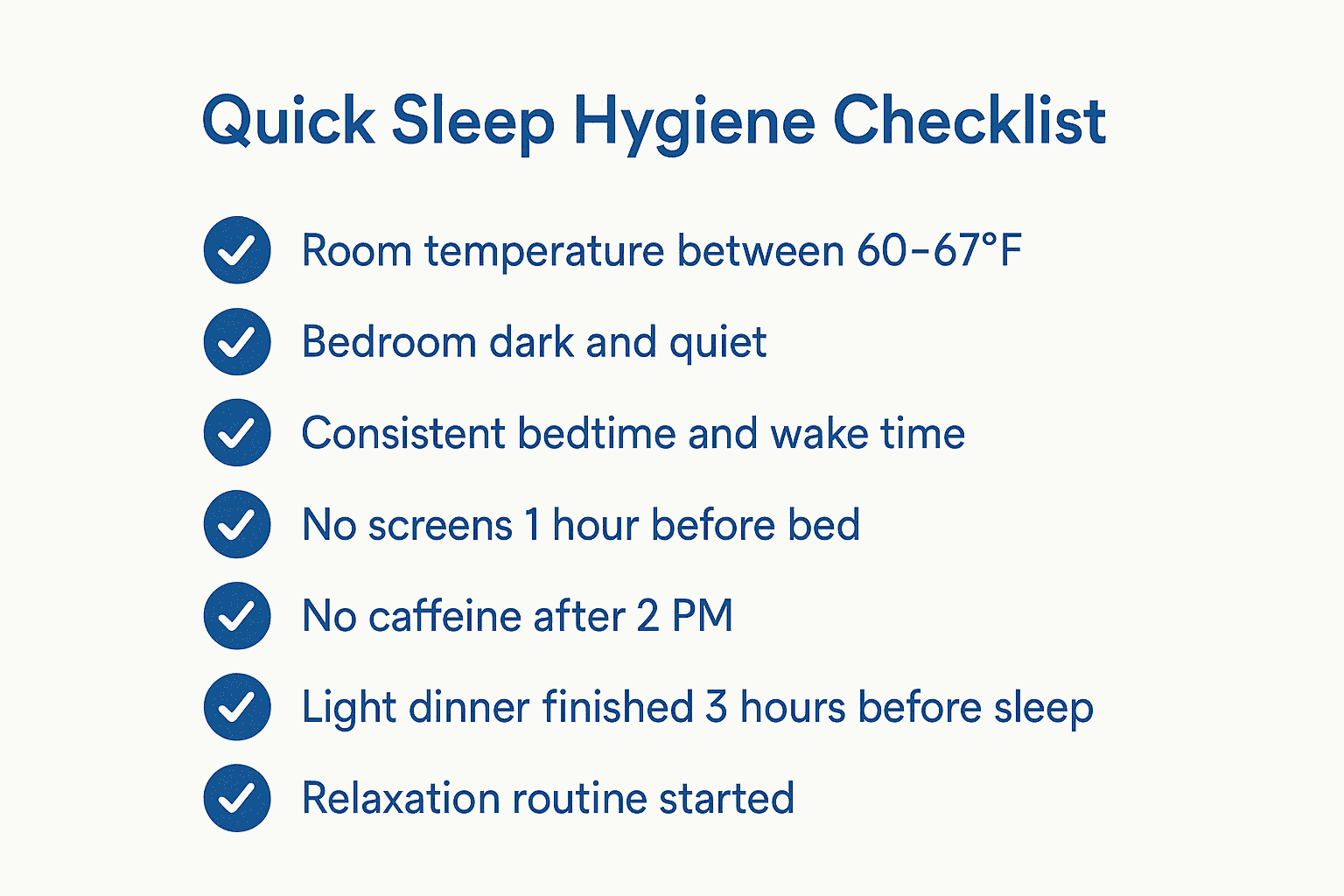Ever wonder why some people fall asleep instantly while you stare at the ceiling for hours?
Sleep problems hit different for everyone. Maybe you can’t shut off your racing thoughts. Or you wake up at 3 AM and can’t get back to sleep.
Perhaps you sleep eight hours but still feel exhausted.
Here’s what most people don’t realize: good sleep isn’t just about getting tired enough to pass out. It’s about creating the right conditions for your body and mind to rest properly.
Your sleep struggles aren’t endless, and you don’t need expensive gadgets or pills to fix them.
21 Tips to Improve Sleep Quality

Learn simple yet effective lifestyle changes, bedtime habits, and relaxation techniques designed to help you fall asleep more easily, enjoy deeper and more restorative rest, and wake up feeling refreshed and energized every day.
Create the Perfect Sleep Environment
Your bedroom should be a sanctuary for rest and relaxation. The right environment signals to your brain that it’s time to wind down.
1. Keep Your Room Cool
Set your thermostat to a temperature between 60°F and 67°F (15°C and 19°C). A cooler room helps your body temperature drop naturally, which promotes deeper sleep.
2. Block Out Light
Use blackout curtains or an eye mask. Even small amounts of light can disrupt your body’s production of melatonin, the hormone that regulates sleep.
3. Reduce Noise
Try earplugs, a white noise machine, or a fan. Consistent background noise can mask disruptive sounds that might wake you up.
4. Invest in Comfortable Bedding
Select a supportive mattress and pillows that align with your preferred sleep position. Replace them every 7-8 years or when they lose their shape.
5. Remove Electronic Devices
Keep TVs, phones, and tablets out of the bedroom. The blue light from screens interferes with melatonin production.
Build a Consistent Sleep Schedule
Your body thrives on routine. A regular sleep schedule helps regulate your internal clock.
6. Go to Bed at the Same Time Every Night
Pick a bedtime and stick to it, even on weekends. This trains your body to expect sleep at a certain time.
7. Wake Up at the Same Time Daily
Consistent wake times strengthen your circadian rhythm. Set an alarm for the same time every morning.
8. Avoid Long Daytime Naps
If you must nap, keep it under 30 minutes and before 3 PM. Long or late naps can make it harder to fall asleep at night.
Develop a Relaxing Bedtime Routine
A calming pre-sleep routine signals to your body that it’s time to prepare for rest.
9. Start Winding Down 1-2 Hours Before Bed
Start with quiet activities, such as reading, gentle stretching, or listening to soft music. This gradual transition helps you relax.
10. Take a Warm Bath or Shower
The drop in body temperature after leaving warm water mimics the natural temperature decrease that occurs before sleep.
11. Practice Deep Breathing Exercises
Try the 4-7-8 technique: inhale for 4 counts, hold for 7 counts, and exhale for 8 counts. This breathing exercise, performed before bed, activates your body’s relaxation response.
12. Write in a Journal
Spend 5-10 minutes writing down your thoughts or tomorrow’s tasks. This helps clear your mind of worries that might keep you up at night.
Watch What and When You Eat for Better Sleep
Your diet plays a bigger role in sleep quality than you might think.
13. Avoid Large Meals Before Bedtime
Stop eating heavy meals 2-3 hours before sleep. Digestion can interfere with your ability to fall asleep comfortably.
14. Limit Caffeine After 2 PM
Caffeine can stay in your system for 6-8 hours. That afternoon coffee might be why you’re staring at the ceiling later.
15. Choose Sleep-Promoting Foods
Foods that help you sleep include:
- Almonds (contain magnesium)
- Cherries (natural source of melatonin)
- Turkey (contains tryptophan)
- Oatmeal (releases serotonin)
16. Stay Hydrated, But Not Too Much
Drink plenty of water during the day, but reduce intake 2 hours before bed to avoid middle-of-the-night bathroom trips.
Manage Stress and Mental Activity
A racing mind is one of the biggest obstacles to a good night’s sleep.
17. Practice Meditation or Mindfulness
Even 10 minutes of meditation can reduce stress hormones and prepare your mind for sleep. Apps can guide beginners through simple techniques.
18. Try Progressive Muscle Relaxation
Tense and release each muscle group from your toes to your head. This technique helps release physical tension stored in your body.
19. Keep a Worry List
If anxious thoughts keep you awake, write them down with a plan to address them tomorrow. This helps your brain let go of the concerns.
Optimize Your Daytime Habits
What you do during the day affects how well you sleep at night.
20. Get Natural Light Exposure
Spend time outside in the morning or sit near a bright window. Natural light helps regulate your circadian rhythm and improves nighttime sleep quality.
21. Exercise Regularly, But Not Too Late
Physical activity improves sleep quality, but avoid vigorous workouts within 3-4 hours of bedtime. The energy boost can keep you awake.
Quick Sleep Hygiene Checklist
Use this sleep hygiene checklist as a daily guide to track your progress, build healthy bedtime habits, and create a restful environment that supports long-term improvements in your sleep quality.
Conclusion
Better sleep doesn’t happen overnight, but these proven tips can help you build healthier sleep habits that last.
Start with 2-3 changes that feel most manageable for your lifestyle. Focus on creating a consistent routine, optimizing your sleep environment, and managing stress before bedtime.
Remember that how to sleep better is often about small, consistent changes rather than major overhauls.
Whether it’s keeping your room cooler, avoiding late caffeine, or practicing breathing exercises, each tip works together to improve your overall sleep quality. Be patient with yourself as you develop these new habits.
Quality sleep is an investment in your health, mood, and productivity. Which of these tips will you try first tonight?







































